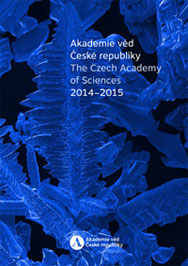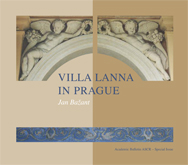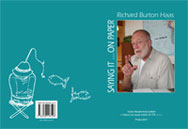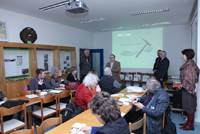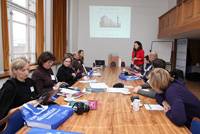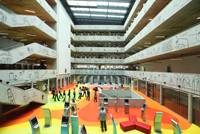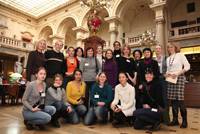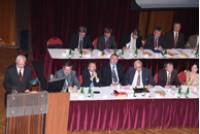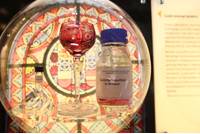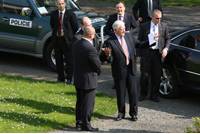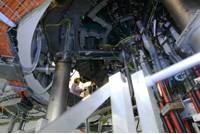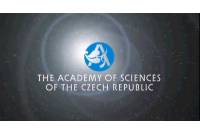Can Parasitology Ride the Rising Star of Disease Ecology?
30 Aug 2016
With a shared focus on host–pathogen relationships, parasitology and disease ecology seem to have a lot in common. But parasitology lacks the eye-catching—and wallet-opening—emphasis on known diseases. By working more closely with disease ecologists, could parasitologists gain more support for work crucial to predicting and controlling infectious diseases? The authors of an article published in the current issue of The Journal of Parasitology believe they can. The researchers studied the increasing popularity of disease ecology, looking at publications, research funding, jobs, and undergraduate courses. The findings of the study suggested that disease ecology could help improve teaching, encourage collaboration, increase funding, and recruit more students to parasitology.
About The Courage to Say: A Spade Is A Spade
5 Aug 2016
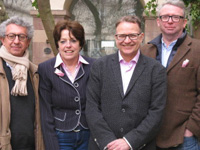 As a satellite event of ESOF 2016, EUSJA’s 45 th anniversary was celebrated in Manchester. The editor-in-chief of Academy Bulletin and Vice president of European Union of Science Journalists' Associations Marina Hužvárová presented a critical assessment of science journalism. “With her very frank and straight forward paper she touched many colleagues” commented Wolfgang C. Goede, member of EUSJA.
As a satellite event of ESOF 2016, EUSJA’s 45 th anniversary was celebrated in Manchester. The editor-in-chief of Academy Bulletin and Vice president of European Union of Science Journalists' Associations Marina Hužvárová presented a critical assessment of science journalism. “With her very frank and straight forward paper she touched many colleagues” commented Wolfgang C. Goede, member of EUSJA.
No title
27 Jul 2016
 An independent pilot study, released today at the Euroscience Open Forum (ESOF) currently taking place in Manchester, demonstrates that bottom-up research funded by the European Research Council (ERC) has already had major impacts. Over 70% of projects evaluated in the report have made scientific breakthroughs or major advances. The study concludes that the ERC invests in truly high-risk/high-gain research and that it also contributes significantly to the economy and society at large. The ERC grants have a very positive effect on researchers’ careers, the report states.
An independent pilot study, released today at the Euroscience Open Forum (ESOF) currently taking place in Manchester, demonstrates that bottom-up research funded by the European Research Council (ERC) has already had major impacts. Over 70% of projects evaluated in the report have made scientific breakthroughs or major advances. The study concludes that the ERC invests in truly high-risk/high-gain research and that it also contributes significantly to the economy and society at large. The ERC grants have a very positive effect on researchers’ careers, the report states.
European Academies' statement: Science is Global
26 Jul 2016
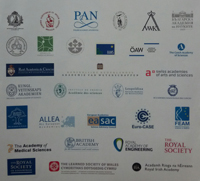 The Czech Academy of Sciences signed a pan-European statement on the value of research cooperation and collaboration internationally: "On the occasion of the ESOF conference in Manchester 2016, Europe’s Academies celebrate the value of science and research. Many of today’s most pressing challenges are global ones. International science and research collaborations greatly enhance the knowledge and tools we need to tackle them. This means institutions from across Europe need to be free to recruit excellent researchers. Our researchers must be able to work, cooperate across borders and travel flexibly as part of multinational activities. We must support the exchange of ideas. Unnecessary barriers to this mobility will weaken science and be to the cost of all nations. The academies of Europe stand together to support our governments in encouraging our countries and institutions to work in partnership to deliver research, scholarship and innovation across the continent for the benefit of society."
The Czech Academy of Sciences signed a pan-European statement on the value of research cooperation and collaboration internationally: "On the occasion of the ESOF conference in Manchester 2016, Europe’s Academies celebrate the value of science and research. Many of today’s most pressing challenges are global ones. International science and research collaborations greatly enhance the knowledge and tools we need to tackle them. This means institutions from across Europe need to be free to recruit excellent researchers. Our researchers must be able to work, cooperate across borders and travel flexibly as part of multinational activities. We must support the exchange of ideas. Unnecessary barriers to this mobility will weaken science and be to the cost of all nations. The academies of Europe stand together to support our governments in encouraging our countries and institutions to work in partnership to deliver research, scholarship and innovation across the continent for the benefit of society."
ESOF 2016 in Manchester
13 Jul 2016
The attention of the global scientific community turns to Manchester in 2016 as the city prepares to host one of the world’s most prestigious scientific events – the EuroScience Open Forum (ESOF). The five day programme is made up of a number of different tracks. In the Science Programme there will be hundreds of seminars, workshops and debates on the latest science and technology from a broad spectrum of leaders and influencers from the scientific community, including Nobel laureates, influential policy makers, business leaders and prominent scientists.
Overcoming Global Threats: Enhancing Intercultural Dialogue, Stability and Peace
14 Apr 2016
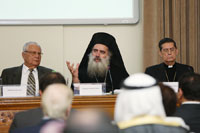 A conference on tackling global threats and a dialogue between cultures was held under the auspices of Foreign Minister Lubomir Zaoralek in the building of the Czech Academy of Sciences and in the Czernin Palace on April 13-14. It was organized by the Centre of Global Studies and the Oriental Institute from the Czech Academy of Sciences, the ambassadors of the Prague Group, and the experts from the Ministry of Foreign Affairs. The conference is one of the Strategy activities which are developed in the research program “Global Conflicts and Local Interactions”.
A conference on tackling global threats and a dialogue between cultures was held under the auspices of Foreign Minister Lubomir Zaoralek in the building of the Czech Academy of Sciences and in the Czernin Palace on April 13-14. It was organized by the Centre of Global Studies and the Oriental Institute from the Czech Academy of Sciences, the ambassadors of the Prague Group, and the experts from the Ministry of Foreign Affairs. The conference is one of the Strategy activities which are developed in the research program “Global Conflicts and Local Interactions”.
Bohemian King Charles IV’s Anniversary
20 Mar 2016
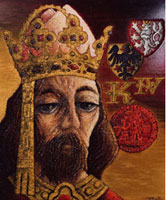 The 700th birth anniversary of King of Bohemia (1346 to 1378) and Holy Roman Emperor (1355–1378) Charles IV has been designated as one of UNESCO’s important world anniversaries for 2016–2017. Throughout 2016, the Sept centennial anniversary will feature a wide array of commemorative events ranging from exhibitions to historical-themed festivities, conferences and celebrations. The Czech Academy Sciences will recreate the period of Charles IV at several exhibitions. The Senate of the Czech Parliament and the Academy will jointly assemble an exhibition, The Legacy of Charles IV in the Course of Centuries, highlighting the impact of Charles’ reign on current Bohemian and European societies. The Academy will explore his impact on the arts, culture, learning and architecture. The Academy will host an international conference on the King of Bohemia’s foreign policy, a colloquium on belles-lettres and literary languages of his era, a summer school centered on “Literature, Learning and Art of Charles IV’s Era” and numerous lectures. Students will be able to acquaint themselves with Charles IV reign through a game. The Academy’s participation will be part of the research programs Strategy AV21.
The 700th birth anniversary of King of Bohemia (1346 to 1378) and Holy Roman Emperor (1355–1378) Charles IV has been designated as one of UNESCO’s important world anniversaries for 2016–2017. Throughout 2016, the Sept centennial anniversary will feature a wide array of commemorative events ranging from exhibitions to historical-themed festivities, conferences and celebrations. The Czech Academy Sciences will recreate the period of Charles IV at several exhibitions. The Senate of the Czech Parliament and the Academy will jointly assemble an exhibition, The Legacy of Charles IV in the Course of Centuries, highlighting the impact of Charles’ reign on current Bohemian and European societies. The Academy will explore his impact on the arts, culture, learning and architecture. The Academy will host an international conference on the King of Bohemia’s foreign policy, a colloquium on belles-lettres and literary languages of his era, a summer school centered on “Literature, Learning and Art of Charles IV’s Era” and numerous lectures. Students will be able to acquaint themselves with Charles IV reign through a game. The Academy’s participation will be part of the research programs Strategy AV21.
ESOF 2016 Travel Grants for young researchers in graphene
14 Mar 2016
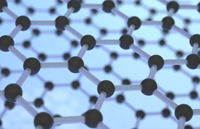 The European Science Foundation (ESF) and Graphene Flagship in collaboration with EuroScience have opened a call for early career researchers who are involved in graphene and related materials research activities to help cover the costs of registration, travel and accommodation to attend ESOF2016. The selected applicants will have the opportunity to participate in the tour visit organised to the National Graphene Institute (NGI) in Manchester and to attend the reception for young researchers at ESOF2016. More information on http://www.euroscience.org/news/grants-for-young-researchers-working-on-graphene-related-research-activities-to-attend-esof2016/.
The European Science Foundation (ESF) and Graphene Flagship in collaboration with EuroScience have opened a call for early career researchers who are involved in graphene and related materials research activities to help cover the costs of registration, travel and accommodation to attend ESOF2016. The selected applicants will have the opportunity to participate in the tour visit organised to the National Graphene Institute (NGI) in Manchester and to attend the reception for young researchers at ESOF2016. More information on http://www.euroscience.org/news/grants-for-young-researchers-working-on-graphene-related-research-activities-to-attend-esof2016/.
Research Center in Taiwan
16 Feb 2016
The Research Center of the Oriental Institute (Czech Academy of Sciences) at Academia Sinica in Taiwan (RCT) has been established on December 3, 2015. The Research Center in Taiwan will act as a branch office of the Oriental Institute of the CAS and is intended to serve as a platform to facilitate and strengthen academic exchange between Czech and Taiwanese scholars as well as institutions. The Center is part of a long-term interdisciplinary research project Power and Strategies of Social and Political Order. Czech research fellows will participate in conferences and hold colloquiums with Taiwanese colleagues. In cooperation with the Academia Sinica the institute plan to organize annual joint workshops whose proceedings will be published. Concomitantly it will continue building the network of partner institutions and thus create a solid foundation for further scholarly exchange. In cooperation with Charles University in Prague I will also support doctoral students wishing to conduct research at the Center.
Algatech Centre
21 Jan 2016
 The Algatech Centre, which is a scientific division of the Institute of Microbiology of the CAS located in the baroque building of the Opatovicky mlyn (mill) near Třeboň in South Bohemia, focuses on the research of photosynthetic microorganisms, including algae, cyanobacteria and photosynthetic bacteria.
The Algatech Centre, which is a scientific division of the Institute of Microbiology of the CAS located in the baroque building of the Opatovicky mlyn (mill) near Třeboň in South Bohemia, focuses on the research of photosynthetic microorganisms, including algae, cyanobacteria and photosynthetic bacteria.
There are at least 70 thousand different and varied species of algae in nature and their potential is huge in many respects. The Laboratory of algal biotechnology therefore studies processes and technology involved in the efficient production of algae and the use of algal biomass. It seeks new bio-active compounds in algae to be used as dietary supplements, in pharmacology and biomedicine and cultivates algae enriched with rare chemical elements which are scarce in both human food and animal fodder. Scientists also carry out research into various metabolites of cyanobacteria and their effects on human cells from the pharmacological and toxicological point of view. Special interest is paid to substances inhibiting the division of cancer cells and/or selectively inducing their apoptosis.




